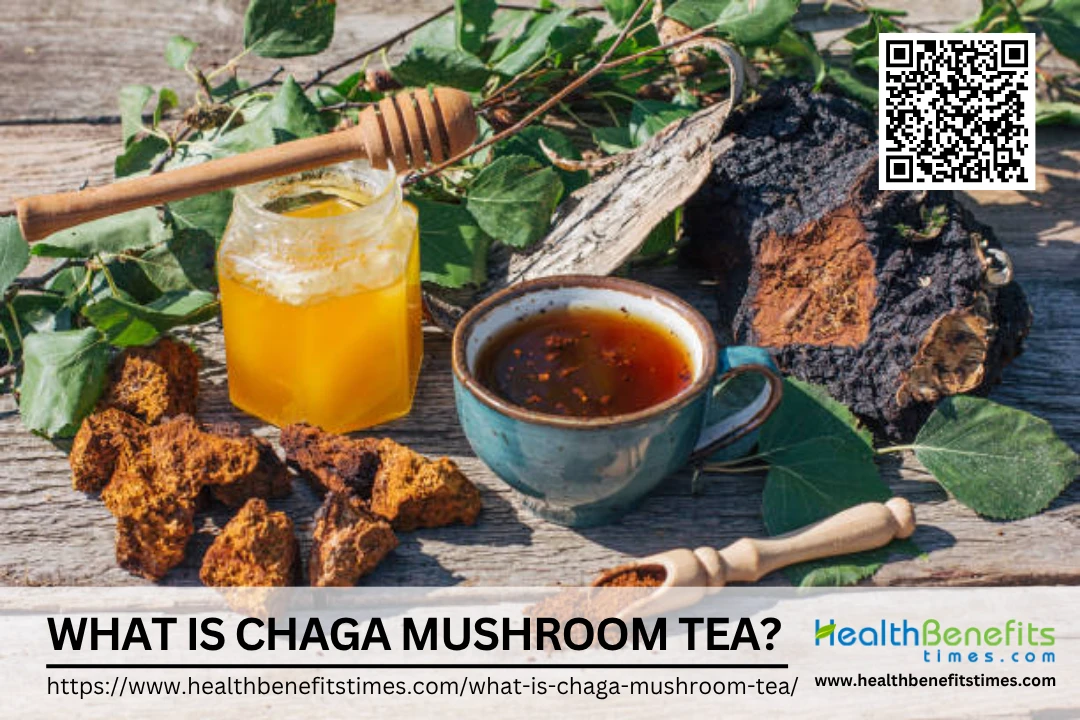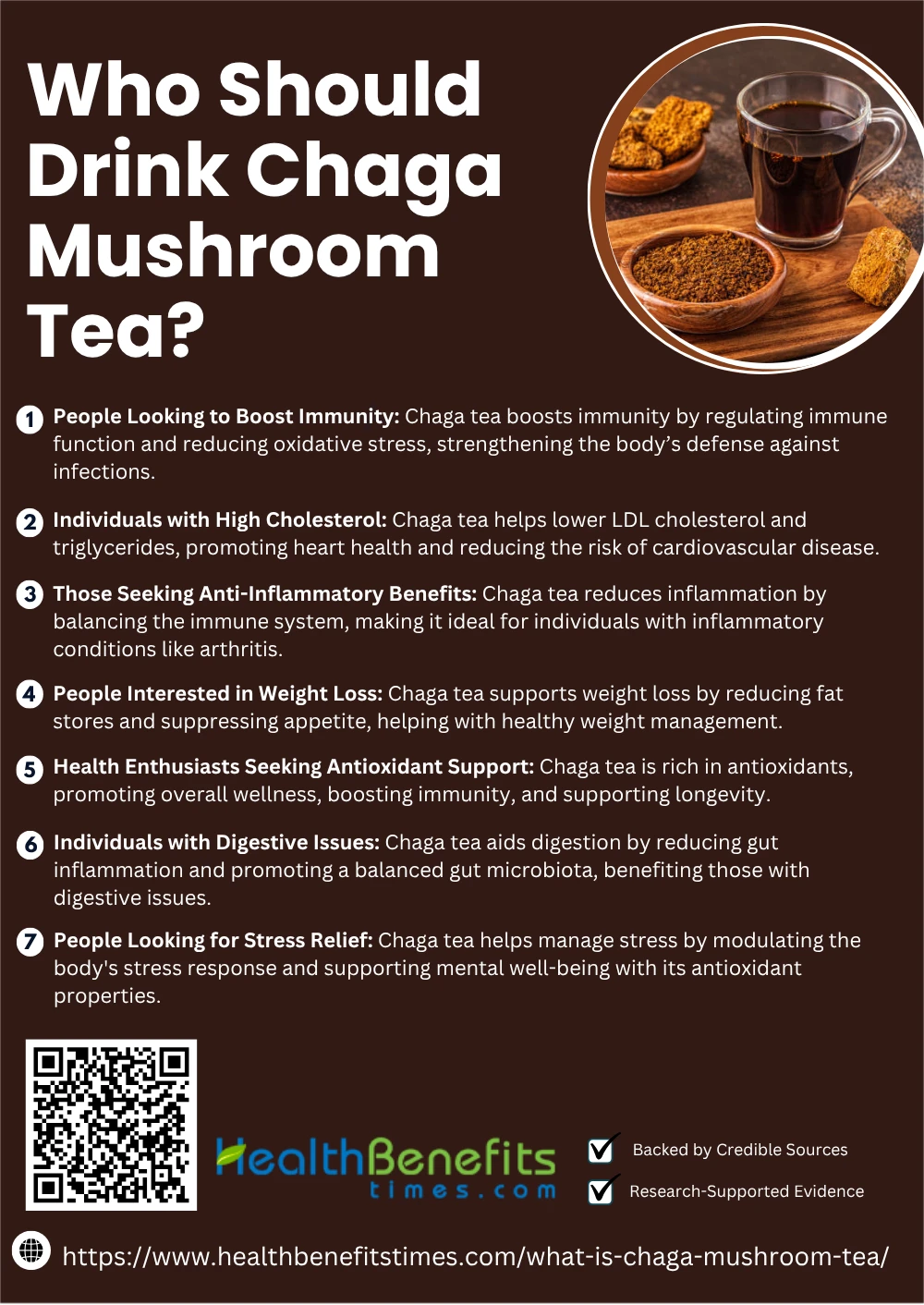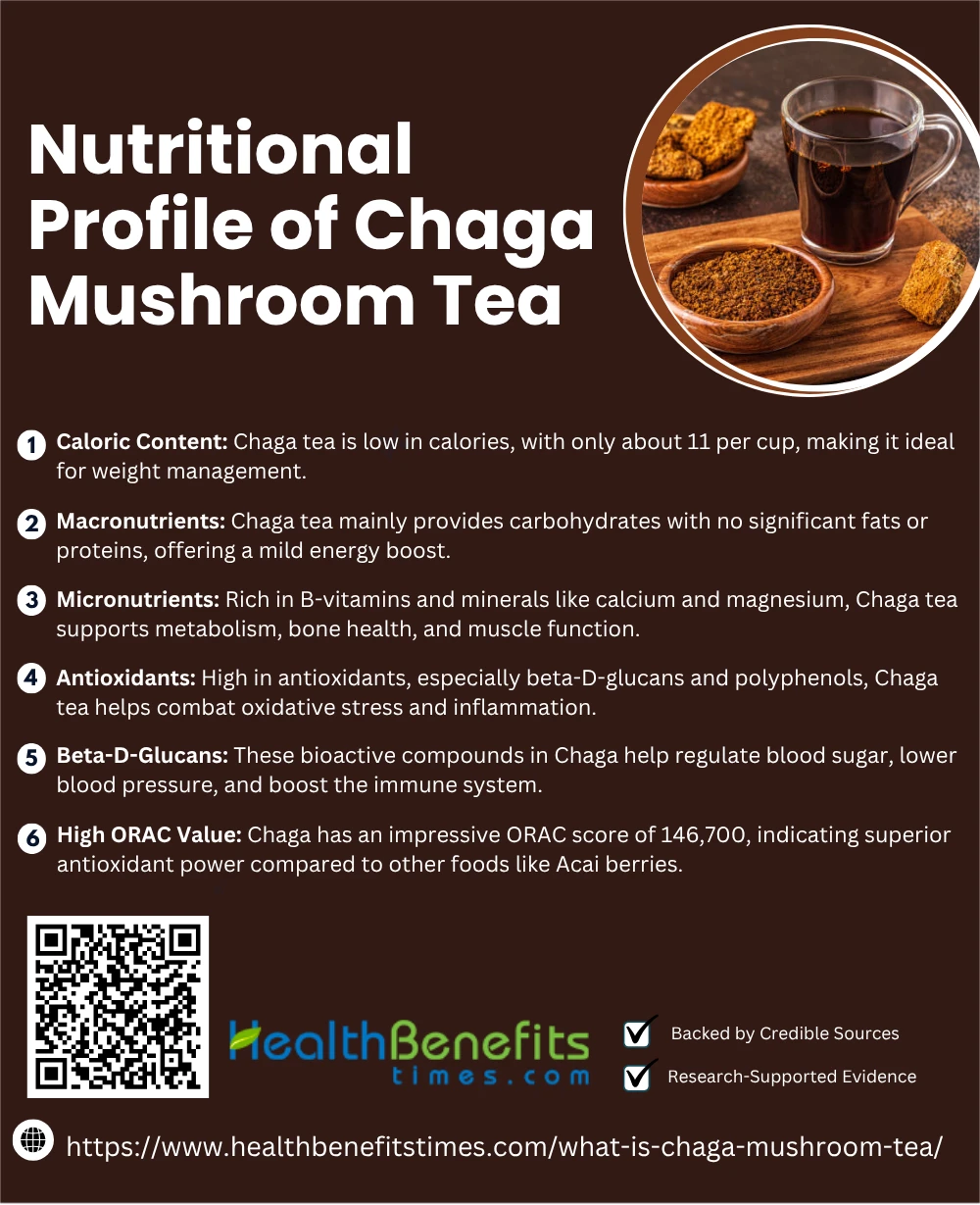 Chaga Mushroom (Inonotus obliquus) is a medicinal fungus that grows primarily on birch trees, and it has been traditionally used for its potential health benefits. It is commonly referred to as “Chaga” and is known for its dark, bark-like appearance and is often considered a natural remedy in folk medicine. Chaga Mushroom Tea is a beverage made by steeping ground Chaga mushroom in hot water. This tea is celebrated for its rich content of antioxidants, particularly polyphenols, and its potential immune-boosting properties. Some research suggests that drinking Chaga tea may help combat oxidative stress, promote cellular health, and even support digestive health. According to a study published in the Journal of Traditional and Complementary Medicine, Chaga has shown promise in enhancing immune responses and lowering inflammation, contributing to overall wellness. Additionally, Chaga is believed to aid in regulating blood sugar levels, which makes it an attractive option for those seeking natural alternatives to improve metabolic health. Furthermore, some reports suggest that Chaga tea may support skin health and reduce the appearance of wrinkles due to its high antioxidant content. While research continues to evolve, the growing popularity of Chaga tea is a testament to its potential health-promoting effects.
Chaga Mushroom (Inonotus obliquus) is a medicinal fungus that grows primarily on birch trees, and it has been traditionally used for its potential health benefits. It is commonly referred to as “Chaga” and is known for its dark, bark-like appearance and is often considered a natural remedy in folk medicine. Chaga Mushroom Tea is a beverage made by steeping ground Chaga mushroom in hot water. This tea is celebrated for its rich content of antioxidants, particularly polyphenols, and its potential immune-boosting properties. Some research suggests that drinking Chaga tea may help combat oxidative stress, promote cellular health, and even support digestive health. According to a study published in the Journal of Traditional and Complementary Medicine, Chaga has shown promise in enhancing immune responses and lowering inflammation, contributing to overall wellness. Additionally, Chaga is believed to aid in regulating blood sugar levels, which makes it an attractive option for those seeking natural alternatives to improve metabolic health. Furthermore, some reports suggest that Chaga tea may support skin health and reduce the appearance of wrinkles due to its high antioxidant content. While research continues to evolve, the growing popularity of Chaga tea is a testament to its potential health-promoting effects.
What is Chaga Mushroom?
Chaga Mushroom (Inonotus obliquus) is a parasitic fungus belonging to the Hymenochaetaceae family, primarily found growing on birch trees in cold northern climates like Siberia, Canada, and northern Europe. It has a distinct appearance, resembling burnt charcoal on the outside, with a golden-brown interior. This mushroom thrives on trees by extracting nutrients, causing the tree to weaken over time. Chaga’s conk is irregularly formed and grows slowly over several years, often seen as a hardened mass on the host tree’s bark. Learn more about Chaga mushroom’s characteristics. (1) Known for its high antioxidant content, Chaga has been researched for its potential medicinal properties, including immune-boosting effects and anti-inflammatory properties. Studies show its potential in supporting overall health, from skin to metabolic functions Chaga’s health benefits. It is commonly harvested in the wild but can also be cultivated for tea and other uses. More about Chaga’s habitat and health impacts. The mushroom’s popularity as a health supplement has risen due to its natural compounds, which contribute to its therapeutic potential Chaga mushroom research.
Nutritional Profile of Chaga Mushroom Tea
Chaga mushroom tea is a powerhouse of nutrients, offering high antioxidant content, vitamins, and minerals. Its rich profile supports immune health, combats inflammation, and promotes overall wellness, making it a valuable addition.
Chaga tea is a low-calorie beverage, with one cup containing only about 11 calories. This makes it an ideal drink for those looking to maintain or reduce their calorie intake. The low caloric value is one of the reasons it is often recommended in various weight loss programs and healthy lifestyle routines. It allows you to enjoy a flavorful beverage without compromising your diet.
2. Macronutrients
The macronutrient profile of Chaga tea is quite simple yet beneficial. It contains 100% carbohydrates with no significant amounts of fats or proteins. This carb-dominant profile provides a mild energy boost without the crash associated with sugary drinks. While it doesn’t provide a significant protein or fat source, Chaga tea is an excellent way to hydrate without consuming unnecessary calories.
3. Micronutrients
Chaga mushrooms are rich in B-vitamins, particularly B1, B2, and B5, which help support your metabolism and provide a natural energy boost. Additionally, Chaga tea contains essential minerals such as calcium and magnesium, both of which are crucial for maintaining bone health and muscle function. These nutrients, combined with its low-calorie profile, make Chaga tea a wonderful addition to your diet, especially for those seeking to enhance their overall health.
4. Antioxidants
Chaga tea is a powerhouse of antioxidants, particularly due to its high concentration of beta-D-glucans and polyphenols. These antioxidants help combat oxidative stress, reduce free radicals in the body, and potentially slow down the aging process. The medicinal properties of these compounds are also linked to anti-inflammatory benefits, which make Chaga an ideal drink for those interested in reducing the signs of inflammation.
5. Beta-D-Glucans:
Beta-D-glucans are complex sugars found in Chaga that offer multiple health benefits. These bioactive compounds help regulate blood sugar levels by improving insulin sensitivity and can also aid in lowering blood pressure. They are also known to boost the immune system, helping the body defend against infections. Chaga’s beta-D-glucans play a crucial role in supporting heart health and regulating metabolic functions.
6. High ORAC Value
Chaga mushrooms are notable for their impressive ORAC (Oxygen Radical Absorbance Capacity) score, which is an indicator of their antioxidant power. With a score of 146,700 μ mol TE/100g, Chaga is nearly 50% more potent than the popular Acai berry, which has an ORAC score of 102,700 μ mol TE/100g.
Health Benefits of Chaga Mushroom Tea
Chaga mushroom tea is celebrated for its numerous health benefits, including immune support, anti-inflammatory properties, and antioxidant-rich compounds. Regular consumption may help enhance vitality, improve digestion, and protect against cellular damage.
Chaga mushroom tea is widely recognized for its rich antioxidant content, which helps protect the body from oxidative stress caused by free radicals. These antioxidants can prevent cell damage and may contribute to reducing the risk of cancer and other health conditions. Studies show that Chaga mushrooms contain higher antioxidant levels than several other superfoods like blueberries and turmeric. (2) Additionally, the tea has been linked to lowering cholesterol and improving immune function. (3) These properties make Chaga tea a potent choice for promoting health. It is also noted for offering benefits in the prevention of oxidative stress-related damage to cells. (4)
2. Boosts Immune System
Chaga mushroom tea is known for its ability to enhance the immune system. The presence of Beta-D-glucans in Chaga can balance immune responses by stimulating the system when needed and calming it when overactive. Additionally, the tea promotes the production of cytokines, crucial proteins that help regulate immune functions. Studies also suggest that it supports white blood cell production, further aiding in infection defense. (3)
3. Reduces Inflammation
Chaga mushroom tea has powerful anti-inflammatory properties. Compounds like Betulinic acid and inotodial in Chaga reduce inflammation by inhibiting cytokine production. The outer layer of the Chaga mushroom contains polyphenols that act as antioxidants, helping fight inflammation. (5) For optimal results, blending Chaga with other mushrooms like Reishi can enhance anti-inflammatory effects. (6)
4. Supports Heart Health
Chaga mushroom tea is beneficial for heart health due to its antioxidant properties. It helps lower “bad” LDL cholesterol, a major risk factor for heart disease. Chaga has also been shown to reduce triglycerides and improve overall cholesterol levels, supporting cardiovascular well-being. (3) Additionally, its compounds may protect the arteries from plaque buildup, reducing the risk of coronary artery disease.
5. Improves Brain Function
Chaga mushroom tea is associated with improved brain function. It helps protect brain cells from damage and may slow brain aging. (7) Chaga has shown potential in reducing oxidative stress and inflammation, both of which can negatively affect brain health. (8) Additionally, studies suggest it may help prevent Alzheimer’s disease-related cognitive decline and improve serotonin levels. (3) (9)
6. Supports Healthy Blood Sugar Levels
Chaga mushroom tea can help maintain healthy blood sugar levels. The beta-D-glucans in Chaga may assist in regulating blood glucose, making it a beneficial supplement for people with diabetes. (10) Studies suggest that Chaga mushroom extract can lower blood sugar levels and improve insulin sensitivity, aiding in diabetes management. (3) However, those on medication should consult healthcare providers before incorporating it into their routine. (11)
7. Boosts Skin Health
Chaga mushroom tea offers multiple benefits for skin health. It helps stimulate collagen production, contributing to firmer, more youthful-looking skin. (12) The antioxidants in Chaga protect skin cells from oxidative stress, promoting skin elasticity and reducing wrinkles. (13) Furthermore, its anti-inflammatory properties may help manage acne and other skin conditions. (14)
8. Promotes liver health
Chaga mushroom tea is beneficial for liver health, offering protective properties. Studies show that Chaga extract may help protect liver tissue from damage caused by harmful substances like tetra-butyl hydroperoxide. (15) Chaga’s antioxidants may also reduce oxidative stress in the liver, supporting overall liver function and preventing certain liver diseases. (3) Additionally, some research suggests that Chaga can improve liver detoxification.
9. Helps with Stress and Fatigue
Chaga mushroom tea promotes skin health by stimulating collagen production, which can lead to firmer, plumper skin and reduce the appearance of wrinkles. (12) Its high antioxidant content helps protect skin from oxidative stress, supporting elasticity and a youthful complexion. (13) Additionally, Chaga’s anti-inflammatory properties can help manage acne and skin breakouts by regulating sebum production. (14)
10. Potential Cancer-Fighting Properties
Chaga mushroom tea shows promise as a potential cancer-fighting agent due to its high antioxidant content, which may help protect cells from damage and prevent cancer growth. Some studies suggest that Chaga mushrooms may assist in developing anticancer drugs, highlighting their potential role in cancer treatment. (16) Chaga’s compounds, such as betulinic acid, have demonstrated anticancer effects in preliminary studies. (17) However, further human research is needed to confirm its effectiveness. (18)
How is Chaga Mushroom Tea Made?
Making Chaga mushroom tea is a simple process, but it requires patience to extract the full benefits from this powerful medicinal mushroom. Here’s a step-by-step guide to preparing Chaga tea:
- Collect all the required ingredients and equipments.
- If using raw Chaga (chunks), break it into smaller pieces (about 1-2 inches). If using Chaga powder, you’re ready to proceed. You can also grind raw Chaga using a grinder, but it’s not necessary for this tea preparation.
- Pour about 4 cups of water into a saucepan or pot. Heat the water to a boil on medium-high heat.
- Once the water is boiling, add the Chaga chunks (1-2 inches) or Chaga powder (1-2 teaspoons) into the water. Stir gently.
- Lower the heat to a simmer. Allow the Chaga to brew for 45 minutes to 2 hours. The longer you brew, the more beneficial compounds will be released into the water. If using raw Chaga, it may take longer to extract the nutrients.
- As the tea simmers, you will notice the water turning into a deep, rich brown color. This is a sign that the Chaga is releasing its nutrients and antioxidants.
- Once the tea has simmered for the desired time, remove the pot from heat. Use a fine strainer or cheesecloth to strain the tea into a cup or teapot, removing any Chaga pieces.
- Chaga tea has an earthy, slightly bitter taste. You can add honey, lemon, or a pinch of cinnamon to enhance the flavor. Adjust to your taste.
- Pour the tea into a mug and enjoy its rich flavor and health benefits. You can drink it hot or let it cool and enjoy it as an iced tea.
Popular Varieties and Flavors of Chaga Mushroom Tea
Chaga mushroom tea comes in various forms, including loose leaves, tea bags, and powdered versions. It is often combined with other herbs or mushrooms, offering diverse flavors to enhance its health benefits.
Classic Chaga tea is the most well-known and widely consumed form of Chaga. Its earthy and rich flavor is characterized by a slight bitterness, but it isn’t overwhelmingly mushroom-flavored, making it accessible to most tea drinkers. Chaga’s potent antioxidants are released during brewing, offering numerous health benefits, including immune support and enhanced digestion. Many consumers enjoy Chaga tea as is, but some choose to add natural sweeteners or other herbal ingredients for extra flavor. For more on Chaga’s health benefits, check out Buddha Teas or learn about its antioxidant content at WebMD. (15) (17) For preparation tips, visit Foraged. (19)
2. Chaga with Cinnamon
Adding cinnamon to Chaga tea results in a delightful combination of warmth and spice. Cinnamon not only enhances the flavor but also adds its own health benefits, including anti-inflammatory properties and blood sugar regulation. The rich earthiness of Chaga blends beautifully with the sweet-spicy kick of cinnamon. This variety is particularly popular during colder months due to its comforting and soothing qualities. For more details about cinnamon’s health properties, check WebMD. Cinnamon and Chaga’s combined antioxidant effects are also discussed in articles at Buddha Teas. (17) Additionally, a recipe for creating your own Chaga-cinnamon blend can be found on Foraged. (19)
3. Chaga and Ginger Tea
Chaga and ginger tea is a dynamic combination that provides both health and flavor. Ginger, known for its digestive and anti-inflammatory properties, complements Chaga’s earthy taste perfectly. This blend is also known to provide a natural boost of energy and can help alleviate nausea or other stomach issues. Both Chaga and ginger are rich in antioxidants, contributing to a healthy immune system. To learn more about ginger’s health benefits, visit WebMD. (15) For additional tips on incorporating ginger into your daily routine, check out this Buddha Teas article. (17) Ginger’s synergy with Chaga makes it an ideal remedy for improving overall health, which you can explore further at Foraged. (19)
4. Chaga with Lemon
Chaga with lemon tea provides a refreshing and tangy twist to traditional Chaga tea. Lemon adds a vibrant, tart flavor while boosting the tea’s vitamin C content. The acidity of lemon pairs beautifully with the earthy flavor of Chaga, creating a rejuvenating and energizing drink. This variety is often enjoyed as iced tea during warmer months, offering a cooling and revitalizing experience. For more on the benefits of lemon, explore Buddha Teas. (17) Chaga’s immune-boosting properties combined with the citrusy vitamin C from lemon can be a powerful combination for health. For more on this tea’s health-promoting qualities, see Foraged. (19)
5. Chaga and Honey Tea
Chaga and honey tea creates a sweet, soothing drink that is perfect for winding down. Honey adds a natural sweetness to balance the bitterness of Chaga while also providing its own health benefits, such as antimicrobial properties and soothing effects on the throat. The combination of Chaga’s antioxidants and honey’s healing properties makes this tea a great choice for both wellness and taste. To learn more about the benefits of honey, visit WebMD. For preparation ideas, check out the recipe page at Buddha Teas. (17) To enhance the therapeutic effects of Chaga and honey, check out Foraged. (19)
6. Chaga and Herbal Blends
Chaga mushroom tea is often combined with other herbs like mint, lemongrass, or chamomile for added flavor and health benefits. These herbal blends not only improve the taste but also provide additional advantages such as promoting relaxation (chamomile) or aiding digestion (mint). Blending Chaga with other herbs is a great way to customize the tea to your personal preferences while still enjoying Chaga’s health benefits. For more on herbal blends with Chaga, check out the full guide on Buddha Teas. (17) Herbal ingredients like lemongrass add extra antioxidants and flavors that complement Chaga’s earthiness, which is discussed in detail on WebMD. (15) You can find various herbal Chaga blends on Foraged. (19)
7. Chaga Mushroom Extract Tea
For those looking for a more potent version of Chaga tea, Chaga mushroom extract tea offers a concentrated dose of its beneficial compounds. The extract is made by boiling Chaga in water to concentrate its nutrients, offering a stronger, more direct flavor. This variety is often used for medicinal purposes, as it provides a higher concentration of antioxidants and other bioactive compounds. Learn more about the benefits of Chaga extract in this Buddha Teas article. (17) To get the most out of your extract, check out preparation tips at WebMD. (15) For a deeper look into the extraction process, visit Foraged. (19)
8. Chaga with Rosehip Tea
Chaga and rosehip tea is a fantastic blend that combines the medicinal benefits of both ingredients. Rosehip, rich in vitamin C, complements Chaga’s immune-boosting properties, making it a great choice for improving skin health and boosting overall immunity. The sweet and tangy taste of rosehip provides a pleasant contrast to the earthy flavor of Chaga. For more on rosehip’s benefits, visit WebMD. (15) This combination offers a boost of antioxidants, making it an ideal drink for those looking to fight off illness. To discover more about the benefits of Chaga with rosehip, check out this guide on Buddha Teas. (17)
9. Chaga Mushroom Coffee
Chaga mushroom coffee blends Chaga with traditional coffee, creating a beverage that combines the rich, bitter taste of coffee with the health benefits of Chaga. This variation is perfect for those who want the energizing effects of coffee but also want to enjoy the antioxidant and immune-boosting properties of Chaga. The combination of caffeine and Chaga’s nutrients provides a balanced boost of energy and focus. For more on how to incorporate Chaga into coffee, check out this WebMD article. (11) Learn how Chaga’s effects on the immune system work synergistically with coffee at Buddha Teas. (17)
Who Should Drink Chaga Mushroom Tea?
Chaga mushroom tea is ideal for health-conscious individuals, herbal tea enthusiasts, and those seeking immune support. It’s also beneficial for people managing inflammation or digestive issues, but caution is advised for certain conditions.
 1. People Looking to Boost Immunity
1. People Looking to Boost Immunity
Chaga mushroom tea is highly beneficial for those looking to boost their immunity. It contains beta-D-glucans, which help regulate immune function by stimulating it when needed and downregulating it when overactive. (16) Additionally, Chaga’s high antioxidant content reduces oxidative stress, further supporting immune health. (3) Regular consumption of Chaga can strengthen your body’s defense against infections and diseases. (20)
2. Individuals with High Cholesterol
Chaga mushroom tea is beneficial for individuals with high cholesterol, as it has been shown to lower LDL (bad) cholesterol levels. The antioxidants and compounds in Chaga may help reduce cholesterol and protect against heart disease. (3) Studies indicate that Chaga can lower both cholesterol and triglyceride levels, while also increasing overall antioxidant levels, promoting heart health. (21)
3. Those Seeking Anti-Inflammatory Benefits
Chaga mushroom tea offers significant anti-inflammatory benefits, making it an excellent choice for individuals with inflammation-related conditions. The beta-D-glucans in Chaga help balance the immune system and reduce inflammation by regulating cytokines, which are responsible for inflammatory responses. (16) Chaga has been used for its ability to reduce inflammation in conditions like arthritis and other chronic inflammatory diseases. (6)
4. People Interested in Weight Loss
Chaga mushroom tea is known for its potential to support weight loss. The mushroom contains betulinic acid, which helps reduce fat stores and suppress appetite, promoting healthy weight management. Drinking Chaga tea can make you feel fuller faster, leading to reduced calorie intake. (22) For more on how Chaga may help with appetite control, visit Birch Boys. (23)
5. Health Enthusiasts Seeking Antioxidant Support
Chaga mushroom tea is a rich source of antioxidants, including melanin, which helps protect the body from harmful free radicals. These antioxidants work together to boost immune function and promote overall wellness, making it an excellent choice for health enthusiasts. Chaga’s antioxidant properties help combat oxidative stress, supporting longevity and vitality. (24)
6. Individuals with Digestive Issues
Chaga mushroom tea can aid individuals with digestive issues due to its anti-inflammatory properties. Chaga helps reduce gut inflammation, which is beneficial for conditions like irritable bowel syndrome (IBS). (21)Additionally, it may support healthy digestion by promoting the balance of gut microbiota and easing discomfort. (25) For more on Chaga’s digestive support, visit Laughing Lichen. (26)
7. People Looking for Stress Relief
Chaga mushroom tea is an excellent natural adaptogen for managing stress. Rich in antioxidants and beta-glucans, Chaga helps modulate the body’s stress response, promoting resilience against daily stressors. (27) Research suggests Chaga may also support mental well-being by reducing oxidative stress. (3)
Potential Side Effects of Chaga Mushroom Tea
While Chaga mushroom tea offers numerous health benefits, it may cause side effects in some individuals. It’s important to be aware of potential allergic reactions and interactions with medications or existing conditions.
 1. Hypoglycemia (Low Blood Sugar)
1. Hypoglycemia (Low Blood Sugar)
Chaga mushroom tea may cause hypoglycemia (low blood sugar) in some individuals. The compounds in Chaga have been found to potentially lower blood sugar levels, which can be problematic for people already taking diabetes medications. If you have a history of hypoglycemia or are on blood sugar-lowering treatments, it is advisable to monitor blood glucose levels carefully when consuming Chaga tea. (10) High doses may exacerbate this effect. (11) Always consult with a healthcare provider before use. (28)
2. Blood Clotting Interference
Chaga mushroom tea can interfere with blood clotting, increasing the risk of bruising or bleeding, especially for individuals taking blood-thinning medications. It is recommended that those with bleeding disorders avoid Chaga. Additionally, Chaga may amplify the effects of blood thinners, making it essential to consult a healthcare provider before consumption if you are on such medications. (15)
3. Kidney or Liver Damage
Chaga mushroom tea can pose risks to kidney and liver health, especially with excessive consumption. High doses of Chaga have been linked to acute kidney damage due to its oxalate content, which can lead to oxalate nephropathy. (29) Additionally, while Chaga may offer some liver protection, prolonged use may increase the risk of liver toxicity. (15)
4. Autoimmune Disease Exacerbation
Chaga mushroom tea may not be suitable for individuals with autoimmune diseases. It can stimulate the immune system, potentially worsening conditions such as rheumatoid arthritis, lupus, and multiple sclerosis. Those with autoimmune conditions should consult a healthcare provider before consuming Chaga to avoid exacerbating symptoms. (30) For more information on who should avoid Chaga, visit WebMD. (15)
5. Gastrointestinal Discomfort
In rare cases, Chaga mushroom tea may cause gastrointestinal discomfort, such as upset stomach, diarrhea, or constipation. These side effects can occur due to individual sensitivities or high doses of Chaga. If discomfort arises, it’s advised to reduce consumption or consult a healthcare provider. (31) Chaga’s impact on gut health is generally positive, but individuals with sensitive stomachs should proceed with caution. (4)
Conclusion
In conclusion, Chaga mushroom tea is a potent herbal beverage known for its rich nutritional profile and health benefits. With its high antioxidant content, it supports immune function, reduces inflammation, and promotes overall wellness. The versatility of Chaga tea, available in various forms and flavors, makes it accessible for different preferences. While generally safe for most, it’s important to be mindful of potential side effects, especially for individuals with certain health conditions or those on medications. Whether enjoyed for its taste or its therapeutic properties, Chaga mushroom tea can be a valuable addition to a health-focused lifestyle.





